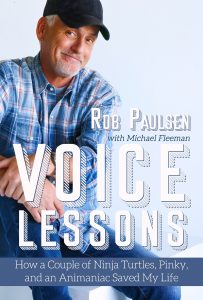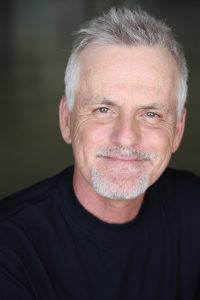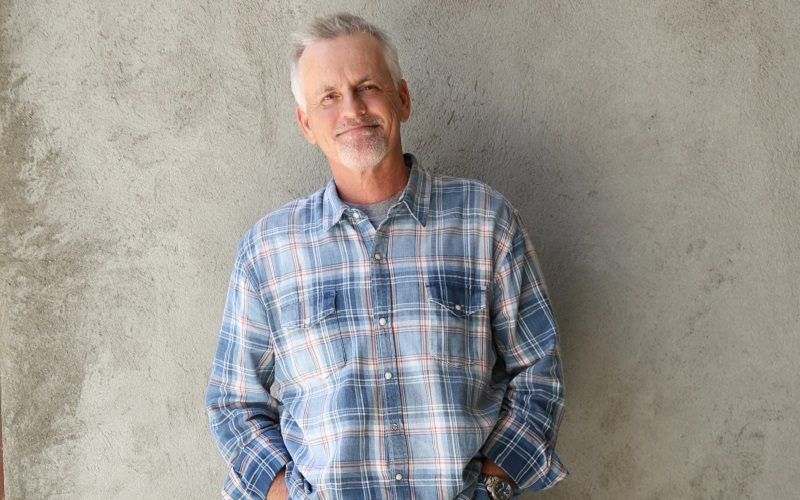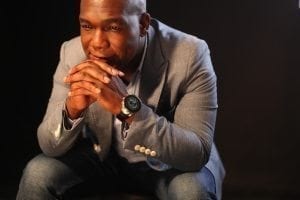Voice acting is one of the most fascinating art forms of the modern era. The way that an audible catchphrase or even a noise can conjure up imagination is impossible to articulate on paper. One can imagine how a line from the iconic voice actor Mel Blanc could immediately bring Bugs Bunny, Porky Pig, and Daffy Duck to life.
While I was always fascinated with the art form throughout my time interviewing voice actors such as Jim Cummings, Tara Strong, and Greg Cipes, I never fully realized how much these characters mean to the actor until I spoke with Rob Paulsen. The voice behind so much of my childhood, including Pinky from Pinky and the Brain, Yakko from Animaniacs, and Raphael from the 1987 Teenage Mutant Ninja Turtles series, Paulsen has compiled quite an impressive resume over the years. And while those may be his most well-remembered roles, Paulsen has compiled an incredible 515 credits, lending his talents to everything from Samurai Jack and The Fairly OddParents to Johnny Bravo and Jimmy Neutron.
Growing up with so many of Paulsen’s projects made me all the more excited to hear that he had recently released a book, Voice Lessons: How a Couple of Ninja Turtles, Pinky, and an Animaniac Saved My Life. The book is a fascinating window into Paulsen’s life, from his early career as a voice actor to his struggles with throat cancer and beyond. Paulsen, who is the official spokesperson of the Head and Neck Cancer Alliance, keeps a positive, honest attitude throughout the book, making the reader feel as though they really understand this talented voice actor and the journey he’s been through. I had the pleasure of hosting a long discussion with Paulsen, where we dove deep into the idea that a voice can truly connect you to a character.
Related: Voice Actress Grey Griffin Tells Us About Her Dream Role
Innovation & Tech Today: Just kicking off, I’d like to talk about your new book. I absolutely loved it, by the way.

But the fact that a fellow like yourself can say, “I really enjoyed it.” That means a lot. I’d had well-meaning fans ask me often, “Hey man, are you going to write a book? You’ve had this great career.” And while I was certainly interested by the suggestion, I thought honestly, the last thing the world needs is another celebrity memoir by a non-celebrity. Because the characters are famous. But once I went through the cancer thing, and especially with what I do for a living and what I learned about how profoundly impactful these characters are to others before my health issues, I thought, “Well, now I’ve got a book.” And it turns out I was right. And so your response is a really big deal to me and I’m so grateful you liked it.
The ostensible reason I came here was to do live action and music, and that’s what I was doing. And then the opportunity presented itself. And yes, it is a more crowded field now, but that’s because there’s more product, there’s more opportunity. I’m pretty old, and when I came here, cartoons were relegated primarily to Saturday morning and the occasional syndicated show and local television, whatever market and a handful of actors did most of them. But now, my God, how did we even know how many 24 hour cartoon channels there would be?
There are prime time cartoons all over the place. Disney, Pixar, video games, podcasts, blah, blah, blah. So yeah, it’s crowded, but the performing arts field or the opportunity to try to do it for a living, I don’t think is any more crowded now than it was when I got here. And the difference is also of course with the nature of social media podcasts, what we’re doing right now talking on cell phones, YouTube, you have so many more avenues from which to launch a creative endeavor that costs you literally nothing. I always love these chats because if I try to find creative ways of not sounding like, “When I was your age,” but the truth is when I was much younger, the options were, do you go to New York or LA? I mean, there were no cell phones, no.
It was, where do you go to get lucky? Luck as I think I mentioned in the book, is that convergence of opportunity meeting preparation, and while certainly “luck” plays a part in all our lives, especially with the creative endeavors, I think what happens is like, I’m a great example of that. I did not know that my career path would go down this road, but what I did know was that I had to put myself in a position to get lucky, and that meant going to LA or New York, so that to the extent that I had anything that was a marketable skill in terms of performance, I was in a position where somebody who could facilitate that could see me. Wasn’t going to happen back in Michigan. So now, it’s kind of different. Denver’s a big market.
Detroit is actually a big market and so you can put yourself on the map, so to speak without leaving home to do what I do. And people like Tara Strong, Greg Cipes, Frank Welker, those folks, you’ve got to still be in LA to audition for the major studios. But to cultivate a creative living in this field, I don’t think it’s necessary anymore. It just is kind of to work on with the major studios. But also I’ve been here for 42 years. I wouldn’t pick up and move here now at 40 or 50 years old because it is still a young person’s game in terms of finding agents and managers to cultivate your talent. It’s incredibly rare where you come out and you say, “I’m 37. I’m 45. I’m 51. I was a former chemistry professor, but boy, I’m really good with my voice.”
They go, “Yeah, well, we’ve already got Rob and Jim and Welker, and all these other people and we’ve got new people who have been here since they’d been 20 and now they’re 30. So why should we invest our time and money in cultivating your talent? Not because you’re not a nice guy or girl, there’s no backend. It’s a business.” That’s the difference. And I would certainly encourage you to, you do have a very clear, thoughtful, smart sounding voice and you are obviously all of those things. So you might as well do it for the joy of doing it. And if it turns out you can make a couple of bucks, great.
I&T Today: A big focus of the book is the relationship with your iconic characters. How would you explain that relationship to somebody that might not understand?

There’s so many pictures in the book, a lot of pictures that didn’t make it to the book only for the cost of printing and all that. But I could do a book, just a picture book with descriptions about seeing people’s responses and even videos of people and how they respond to Pinky or Yakko or Carl, or Donatello, or Raphael, Arthur, Undertaker, or Mighty Max, you name it.
And my relationship, especially with the more iconic ones, has become much deeper, much more precious. Because I know the characters are much bigger than a paycheck. Long after I’m dust, these characters will continue to be a source of joy and maybe even inspiration to literally millions of people. Now, when I *getting into Yakko character* started ripping at Yakko, and I say I know what we’re doing right now. And you’re not only smiling, maybe chuckling, but you might even have this experience that is a little deeper than just, “Holy sh*t, that’s pretty cool.”
You might even go, “Oh my God, that’s a partner. That’s fucking amazing.” And you might even think about it later, and think, “Oh my God, I didn’t realize that hearing this guy, the Yakko, *breaking back into Yakko character* “Hey man, you should come down and take a tour of the water tower, no problem. Just bring your own booze, okay?” I have people who get tearful, people who start to shake, not because it freaks them out, because it will suggest a deep cheated happy memory that is nothing short of profound. And it may be truly happy. “Oh my God, that reminds me of watching it with my dad, or my mom, or my sister or my brother, or my grandfather who’s gone, or my dad, whom I had a very contentious relationship with. And, Hey dad, he loved thinking of life. And we kind of had that voice. I can’t believe it. The only thing that I connected with my dad was that one.”
And that happens all the time. I didn’t know that until I recounted all these experiences and they helped me with his inherent joy, get through a period of my life. But I swear to you, my plan, there was a period of about six weeks where I thought, “There is no way, I’m not going to get through this.”
Honest to God, man, I don’t even know how to quantify it. It’s so much bigger. And I really appreciate you dealing with my rambling, because when I get a chance like this to talk with a nice young person who’s willing to hear me out, it is an important story.
I riff all the time and all the characters do is make people happy, but I’m deeply aware of how profound that relationship is with others, many of whom I will never meet. But I can make the argument, a legitimate cogent argument, that there are people in the world who could say, “Brad Pitt, oh yeah, he won an Oscar.” But you ask him about Ninja Turtles and they’ll sit down and say, “Oh, let me tell you about Ninja goddam Turtles, and it’s not just a bunch of eight year olds. It is remarkable, and nice people, understanding people like you give me the opportunity to tell the story. It’s a big deal, man. And not just me, Tom Kenny and SpongeBob, Jim Cummings and Winnie the Pooh and Tigger, or Seth Green and Chris from Family Guy. I mean, it’s crazy how deeply these characters affect people. And I am the one who gets all the glory. I’m a profoundly fortunate fellow man. And you are giving me the opportunity to express it. It’s a big deal.
I&T Today: It’s so interesting that you bring that up. Just as you were doing the Yakko voice, I started getting nostalgic. So there’s a picture frame still at my parents house and it’s my dad carrying me in a beanbag. I must have been like three years old and it’s an Animaniacs picture frame.
Rob Paulsen: How about that now? Okay, so isn’t it interesting how these opportunities arise? We just go back. This is going to make for a great story for both of us.
It is never not amazing to me. It’s a big deal every time it happens to me and to the listener. I was at the Circus Olay this weekend. My family’s in town from Michigan and we all had a sort of a small reunion. We all went to Circus Olay. I was trying to get some popcorn and the guy behind me said, “Are you Rob Paulsen, the voice guy?” I said, “I sure am.” And it was purely joyful. It was.
It turns out Dustin Hoffman was there too. Well, a lot of people are going to make a fuss over Dustin Hoffman, and they should. But this young man, once I opened my mouth, everybody around him said, “Are you kidding me? I love Animaniacs.” So one guy lit the fuse and within 30 seconds, 10 people are going, “Hey, this old guy with gray hair, he’s not Dustin Hoffman, he’s Yakko!” How cool is that?
I&T Today: That’s got to be such an interesting feeling.
Rob Paulsen: Oh, it’s fantastic.
I&T Today: What’s your general process for creating a character’s voice?

So Ninja Turtles, Animaniacs, Pinky and the Brain, Jimmy Neutron, the truth is, I’ve been more fortunate than most actors because I’ve gotten to create characters from a clean sheet of paper and now they’ve gone on to become, I think, arguably iconic. I think that most people would suggest that in terms of pop culture, Turtles, Pinky and Yakko at least, and maybe even Carl Wheezer are iconic animated characters. And I’ve had the great, good fortune of being part of it from a literal clean sheet of paper. I’m not very good at doing my version of Winnie the Pooh or Mickey or Homer Simpson. If the Simpsons continues on for another 20 years, I’m not the guy that they would call because I’m not very good at that.
I’m much better at being creative for its own sake in a new one. And I’ve had really great stuff to work with. And here we are with the King of Hollywood. Mr. Spielberg in his seventies has decided to do Animaniacs and Pinky and the Brain again, with Yakko, Wakko, and Dot. And Pinky and the Brain the original voice actors, that’s a big deal for a guy who could call literally anyone in the world and they would be glad to do it. But he knows that in this realm, the audience wants the authenticity of the characters that makes them respond just like you did. And so he’s gone to bat for us and we’re in, that’s a huge thing for a non-celebrity talent, but he knows the profound depths to which these characters mean a lot to people. And the voice is an enormous part of it.
And the voice connects with the soul of the characters and thereby others and the audience. I make strong choices and even if they’re wrong, they’re clear. And then we whittle them down as we progress. And if you listen to Bugs or Pinky or even Mickey, characters that had become utterly iconic. Daffy, they sound a little different from the early 50s or the late 40s than they do to the mid 70s. Some of that is because of Mel changing or trying different stuff. And some of it is because of the sensibilities of the characters changing as a result of input from people on the other side of the microphone. So I love that process. And often that’ll happen if you go to see an original broadway cast and then maybe see a revival years later where the big actor who created the character originally comes back to do it 20 years later, it’ll be a little bit different.
The song will be the same, but the actor will choose to tweak a couple of notes here and there and the audience might sing the notes they remember from the original album. But the actor will say, “I’m going to try something different just to juice it up a little bit.” And it works fine. It’s a different take on it, but it still is creative and impactful. And I know that sounds like a fancy way of explaining it, but I hope it makes sense. When you’re lucky enough to get to go back and tweak it again, the sense and the authenticity of the characters is there. But part of the cool thing about Animaniacs is that it’s very self-aware, very subversive.
We acknowledge the fact that time has passed, and it makes for an interesting tweaking of the characters that is not at all off putting. It’s just really cool and it works in the context of the character. So they’re kind of smartass to begin with. And that’s why it works. So it’s really all about allowing everybody to kind of get their two cents in. And especially with respect to voice work, we are by nature pretty ego-less because it’s not about how we look. So we want the input and the calculus of Mr. Spielberg or the new writers to come in to play and say, “What do you think about this and that?” Some work, some don’t. And I love the opportunity to throw it all against the wall.
Voice Lessons: How a Couple of Ninja Turtles, Pinky, and an Animaniac Saved My Life is available online and in bookstores!
Additionally, keep in mind it’s the Head and Neck Cancer Alliance Awareness Week!









